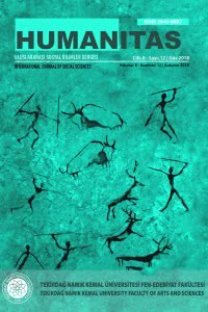Wittgenstein ve Foucault'da Gramer ve İktidar
Foucault, iktidarı modern politik kurumlardan yayılan, toplumun bütününe yukarıdan nüfuz eden, baskıcı, negatif bir güç olarak anlayan Marxizm, Freudçuluk, ve liberalizm gibi modern iktidar söylemlerini eleştirir. Onun açısından, modern iktidar öznellik alanlarını, insan bilimleri disiplinlerinin söylemleri çerçevesinde, inşa ederek var olur ve modern özneler aynı anda hem bilgi hem de tahakküm pratiklerinin nesnesidir. Wittgenstein’ın dil oyunlarını ve grameri toplumsallığımızın kurucu öğeleri olarak tanımlaması ile Foucault’nun iktidarı üretken ve dinamik bir stratejik kurucu ilişkiler ağı olarak görmesi arasında anlamlı benzerlikler vardır. Bu çerçeve içinde, Peter Winch ve David Bloor’un Wittgenstein felsefesini toplumsal inşacı bir perspektiften okumaları analiz edilmiş, eleştirilmiş ve ardından Arnold. I. Davidson ve Ian Hacking’in yaklaşımları çerçevesinde Foucault’da suç ve suçlu kavramlarının Wittgenstein felsefesi perspektifinde bir yorumu yapılmıştır.
Anahtar Kelimeler:
Ludwig Wittgenstein, dil oyunları, Michel Foucault, öznellik, politik felsefe
Grammar and Power in Wittgenstein and Foucault
Foucault criticizes modern discourses on power such as Marxism, Freudianism, and liberalism in which power is understood as a repressive negative force that radiates from modern political institutions to the whole society from above. For him, modern power, with the involvement of the discourses of the humanities, sustains and maintains itself by producing subjectivities and the modern subject is simultaneously an object of knowledge and of domination. There are philosophically significant similarities between the ways Wittgenstein describes language games and grammar as formative elements of our sociality and Foucault’s understanding of power as a productive and dynamic grid of strategic formative relations. From this perspective, Peter Winch’s and David Bloor’s accounts of social constructive interpretations of Wittgenstein are analyzed and criticized, then a Wittgensteinian interpretation of the concepts of the crime and the criminal is presented on the basis of Arnold I. Davidson’s and Ian Hacking’s arguments on historical ontology.
___
- Prof. Dr. Ayşegül Baykan. YTÜ İTB Bölümü
- ISSN: 2147-088X
- Yayın Aralığı: Yılda 2 Sayı
- Başlangıç: 2013
- Yayıncı: Namık Kemal Üniversitesi
Sayıdaki Diğer Makaleler
“Susuz Yaz”da Mülkiyet, İktidar Mücadelesi ve Kadının Nesneleştirilmesi
Modern Agoraların Işıltılı Yüzü: Estetik Emek
Şiddet İçerikli Bilgisayar Oyunlarının Ergenlerin Saldırganlık Eğilimine Etkisi
Çağdaş Amerikan Şiirinde Irak Savaşı
Monomitik Kurmaca Söylem Olarak Oluşum Romanı: Büyük Umutlar'da Kimlik Oluşumu ve Öne Sürümü
Wittgenstein ve Foucault'da Gramer ve İktidar
Kremlin Yanıyor: Alevlerin Dilinden 18. Yüzyıl Rusya’sı
Louis De Bernières’in Kanatsız Kuşlar Romanında Sosyal Kimlik Oluşumu
